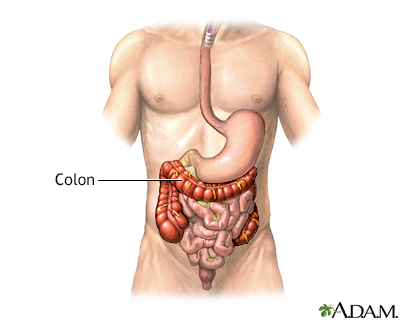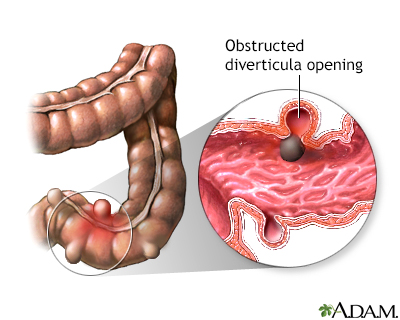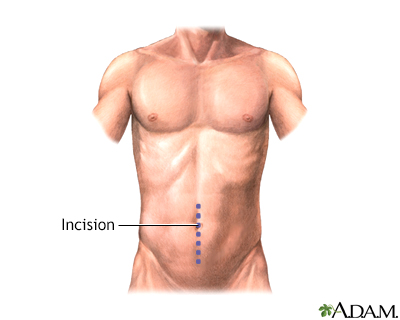Colon diverticula
Normal anatomy
|
|
The colon, or large intestine, is a muscular tube that begins at the end of the small intestine and runs to the rectum. The colon absorbs water from liquid stool that is delivered to it from the small intestine.
|
Indications, part 1
|
|
Diverticula are out-pouchings of the wall of the colon. They are thought to be the result of a diet low in fiber. By the age of 60, over half of all Americans have colonic diverticula.
|
Indications, part 2
|
|
In most cases, diverticula go unnoticed. However, in a small percentage of patients, diverticula can cause problems. The most common problem is diverticulitis, which occurs when a small, hard piece of stool is trapped in the opening of the diverticula. This leads to inflammation and sometimes death of the segment of colon containing the diverticula.
|
Indications, part 3
|
|
Diverticula can also bleed and cause significant blood loss from the gastrointestinal tract. Vessels overlying a diverticula are stretched until they break, causing bleeding into the colon. Blood is usually passed in the stool.
|
Incision
|
|
Treatment of complicated diverticulitis and diverticular bleeding may involve surgical removal of the segment of colon containing the diverticula. While the patient is deep asleep and pain free (general anesthesia), an incision is made in the midline of the abdomen.
|
Procedure
|
|
After the diseased area is removed, the healthy ends of the colon are sewn back together. Occasionally, especially in cases of diverticulitis, where there is significant inflammation, a colostomy is performed. After the inflammation has resided, the colostomy is removed and the healthy ends of the colon are sewn back together.
|

Review Date:5/4/2022
Reviewed By:Michael M. Phillips, MD, Emeritus Professor of Medicine, The George Washington University School of Medicine, Washington, DC. Also reviewed by David C. Dugdale, MD, Medical Director, Brenda Conaway, Editorial Director, and the A.D.A.M. Editorial team.
The information provided herein should not be used during any medical emergency
or for the diagnosis or treatment of any medical condition. A licensed medical professional
should be consulted for diagnosis and treatment of any and all medical conditions. Call 911
for all medical emergencies. Links to other sites are provided for information only -- they
do not constitute endorsements of those other sites. © 1997-A.D.A.M., Inc. Any duplication or distribution of the information contained herein is strictly prohibited.
The Agency for Health Care Administration (Agency) and this website do not claim the information on, or referred to by, this site is error free. This site may include links to websites of other government agencies or private groups. Our Agency and this website do not control such sites and are not responsible for their content. Reference to or links to any other group, product, service, or information does not mean our Agency or this website approves of that group, product, service, or information.
Additionally, while health information provided through this website may be a valuable resource for the public, it is not designed to offer medical advice. Talk with your doctor about medical care questions you may have.






